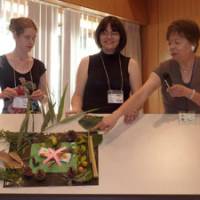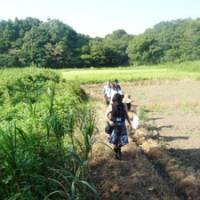Forty people from 19 countries have been taking part in tours, which included home-stays and exchanges, since June to experience community life in various parts of Japan with local residents.
The participants in the program, organized by Tokyo-based nonprofit organization World Campus International every year since 2007, range in age from 18 to 32. The countries they hail from include the United States, Venezuela, the Netherlands, Finland, China and Kenya.
Hideto Yasui, general manager of WCI, said the group is trying to connect youths from all over the world with communities in Japan. "We want to offer them a place where both sides can share their views, and find out something new about each other," he said.
Since WCI launched the program in 2007, 142 people from 32 countries have taken part.
"It was a good opportunity for me to get in touch with people that I'm normally not in touch with," said Sida Zhou, 23, a Chinese-Finnish graduate student from Finland who took part in a recent tour to Chiba and Ibaraki prefectures. "Interacting with other youngsters from all over the world is also interesting."
As a science student, he added that he would definitely want to come back to Japan if he has the opportunity to work here in the future.
This year, tours took in Kumamoto, Hiroshima, Nagasaki, Nara, Nagano, Ibaraki, Aichi, Tokyo and Chiba prefectures, wrapping up with a visit last week to Abiko, Chiba Prefecture. Each of the two-week tours combined visits to two cities, with each participant paying ¥200,000 to cover the expenses of each tour.
The tours featured programs organized by NPOs and municipalities in host communities that allowed the participants to have direct exchanges with local residents. For example, during the two-week tour in Ibaraki and Chiba prefectures, participants visited a home for the elderly as well as a nuclear power plant, followed by a session in which they exchanged views with students from Ibaraki University on the nuclear industry.
The participants stayed at the homes of host families in each of the destinations.
The last tour to Chiba and Ibaraki prefectures included a nature walk last Wednesday in a marsh surrounded by hills in Yatsu in the suburbs of Abiko. The area, once planned for development, has been designated by the city for preservation.
The participants were divided into four groups after the walk, in which they were asked to make a collage of what they think is an "ideal Earth." Each group created a unique collage with fallen leaves and objects they collected in the area, followed by a discussion of how they think nature can be preserved.
"I was impressed by how conscious of nature these youngsters were," said Akiko Suzuki, representative of a local citizens' group that has worked to preserve the area. She gave a lecture during Wednesday's tour. "I wanted to tell the youths how important it is to love nature around us, because I believe that this results in preserving the environment as a whole."
Ilse van der Pol, an 18-year-old Dutch student from Leiden University, said walking in Yatsu was a whole new experience for her. "I was impressed that such abundant nature, with lots of creatures (existing) in the middle of a city like Abiko," she said.
Aviana Bech, 21, agreed. She said it was exciting to share this kind of experience with young people from other countries. "Because we were quite a small group, it was easy for us to get close to each other and exchange notes about each other's country," she said.




